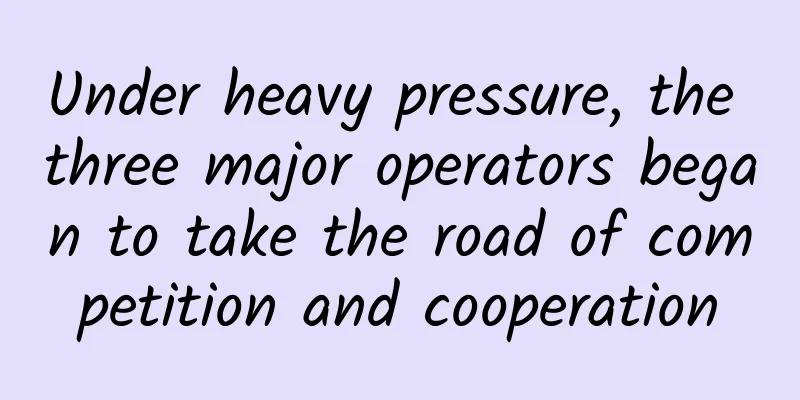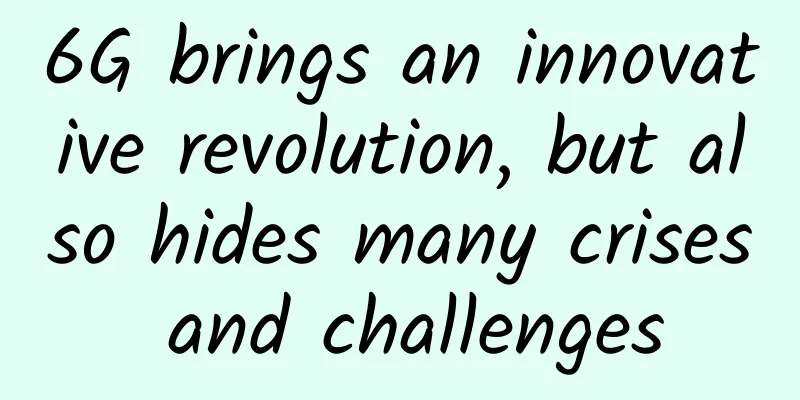Under heavy pressure, the three major operators began to take the road of competition and cooperation

|
Today, with the increasing homogeneity of the five major competition areas, namely, network, business, tariff, content and service, the three major telecom operators, namely, China Mobile, China Telecom and China Unicom, have almost played all their cards. Price seems to be the only means and weapon, and the entire market competition has already shown a state of strangulation. Recently, Qinghai Telecom has taken the lead in communicating and negotiating with the three major local operators on the issues of violations and excessive competition, such as ultra-low prices, high subsidies, free commissioning fees, and free broadband and TV promotion. Three major operators in a province were summoned for misleading consumers with their advertisements In 2018, a provincial industrial and commercial bureau continued to receive complaints and reports from consumers across the country, claiming that the advertisements for "unlimited data" mobile phone packages released by China Mobile, China Unicom and China Telecom did not match the actual situation. Consumers generally report that when the monthly traffic usage of the mobile data services provided by the three major operators reaches 20GB or 40GB, the mobile phone will experience video freezes, very slow images, and cannot transfer files and videos normally, and cannot access the Internet normally. When the monthly traffic usage reaches 100GB, the traffic service will be stopped and the Internet cannot be accessed at all. Consumers are very indignant about the advertising deception of the three major operators and require the industrial and commercial departments to strictly investigate and deal with it. In fact, the false propaganda of some operators is a result of excessive competition among operators, and ultimately it is the interests of consumers that are harmed. Operators' competitive consciousness destroys "competitiveness" The competition among the three major operators has been going on for a long time, especially in the 4G era, when the three operators have been engaged in a price war, resulting in the dilemma of increasing revenue but not profits. However, we will find that operators in many places, on the one hand, say that the rates are too low, and on the other hand, they are giving away free cards and attracting users at a loss. So we see the scene of crazy stalls in the campus market, and even "hand-to-hand combat" from time to time. If you ask them, can they make money with such cheap rates and free gifts? Operators may tell you in unison: No! But if they don't do this, all users will go to other operators. Personal communication charges have become cheaper. A good breakfast is enough to pay for a month's communication fee. In fact, most people don't care about a few dozen more or less in communication fees. But if you clearly say that it will cost 80 a month, and you say it's only 50 a month when you open the card, but not long after, you quietly increase it by 30 in various ways, will the user experience be the same in these two situations? But why is no one willing to be the one who charges 80 yuan? Because of competition! Others advertise that they only charge 50 yuan, but I charge 80 yuan. Where will the users come from? This is the general competition logic of operators under the strong "competitive consciousness" - grabbing people is the first priority. Because people are grabbed, not attracted by services. The more you grab people, the worse the service. If the service is poor, how can you be competitive? Competition is not that important. When we keep a close eye on our competitors, we neglect our customers. Operators should shift their focus from competitors to customers, pay close attention to customer needs, and improve their capabilities to meet customer needs. Customers are what we should really keep a close eye on. Serious internal friction in the operator industry The communications industry is a highly market-oriented industry, and operators are also one of the first batch of central enterprises to enter the market. The market is the most effective way to allocate resources because there is sufficient competition in the market. Competition in the operator industry is often fierce. In addition to price wars, operators have spent a lot of money on marketing in recent years. Low-price promotions, high terminal subsidies, free gifts and other activities have once again deepened the burden on operators. Because the three companies have their own networks, the quality of the network determines the quality, so consumers have room for choice. For power grids and railways, there is only one network in the country, so no matter how you compete, it is useless. It must be said that the communications industry is a field where domestic monopoly industries have been reformed better. But in foreign countries, the profits of operators are not low. Before the mobile Internet, everyone made a lot of money by voice and text messages. After the mobile Internet, life is not as good as before, but it is still not bad. The average monthly consumption of a user of US operators is more than 100 US dollars, while the average monthly consumption of a user of China Mobile is only more than 70 yuan. From this, we can also see that the "competitive consciousness" of operators has sometimes evolved into internal friction in the industry where operators "poach" each other. Such competitive consciousness not only fails to improve the competitiveness of operators, but destroys their own competitiveness and lowers the value of the entire industry. Operators need to change their thinking in the 5G era In today's 5G era, facing huge investment pressure, operators are having a harder time. Not only do they need to invest huge amounts to build 5G base stations, but they also have to bear the consequences of profit losses left over from price wars in the 3G and 4G eras. Qinghai Telecom took the initiative to lead the three operators to solve problems such as violations and excessive competition. This approach is not easy and is worth learning from for companies in other provinces and cities! The competitive consciousness that only focuses on the "old business" and only engages in "infighting" is an unhealthy competitive consciousness. The real competitive consciousness should be the consciousness of innovation, forge ahead, conquer cities and territories, and constantly expand boundaries. A true "sense of competition" will prompt us to regard outstanding Internet and technology companies as competitors, improve innovation and service capabilities as a means of competition, and gradually form a differentiated industry competition pattern. Only in this way can companies have real competitiveness, the industry ecology will improve, and employees' lives will improve. |
<<: Yunnan Telecom will gradually shut down its 3G network starting June 1
>>: Juniper Networks focuses on AI technology to fight the epidemic
Recommend
IEEE technical white paper officially released, lossless network research enters a new stage
Recently, the "IEEE 802 Nendica Report: The ...
Can 5G save operators from negative growth at the beginning of the year?
Although work has not yet been fully resumed, the...
RAKsmart: Japan/Hong Kong/US popular cloud servers as low as 10% off $12.15/year, regular cloud servers 30% off
RAKsmart also offers promotions for cloud servers...
Token: How to reduce the traffic pressure of user identity authentication?
Many websites usually use the Session method to i...
Why ordinary users don’t feel the 3rd anniversary of 5G license issuance
As of April this year, the total number of 5G bas...
iQIYI Annual Card + JD Plus Membership Annual Card 138 RMB
This year, the prices of various video and music ...
Huawei Cloud Double 11: Cloud server annual payment starts from 88 yuan, new and old users can receive up to 11,110 yuan in coupons
A few days ago, we shared the Double 11 event of ...
Europe focuses on 6GHz rules, Wi-Fi -7 is still a long way off
European regulators have been facing increasing p...
The Winter Olympics is about to open, and the on-site communication network technology is deeply revealed!
In 11 days, the world-renowned Beijing Winter Oly...
South Korea's 5G penetration rate is close to 10%, 14 times that of China, and the United States' 5G penetration rate is 0.63%.
The Ministry of Science and ICT of South Korea re...
5G in 2021: Expectations and Developments
5G is the fastest growing mobile technology in hi...
Migrate to the cloud safely? See how Neusoft Cloud Start (NCSS) does it
Today, the development of cloud computing has rea...
How to apply code intelligence technology to daily development?
01/ Let’s start with the developers’ worries When...
Cutover failure leads to major communication failure
[[429302]] Japan has once again experienced a maj...
An article explains the detailed process of SSL handshake protocol
[[274498]] Overview SSL (Secure Socket Layer) is ...









